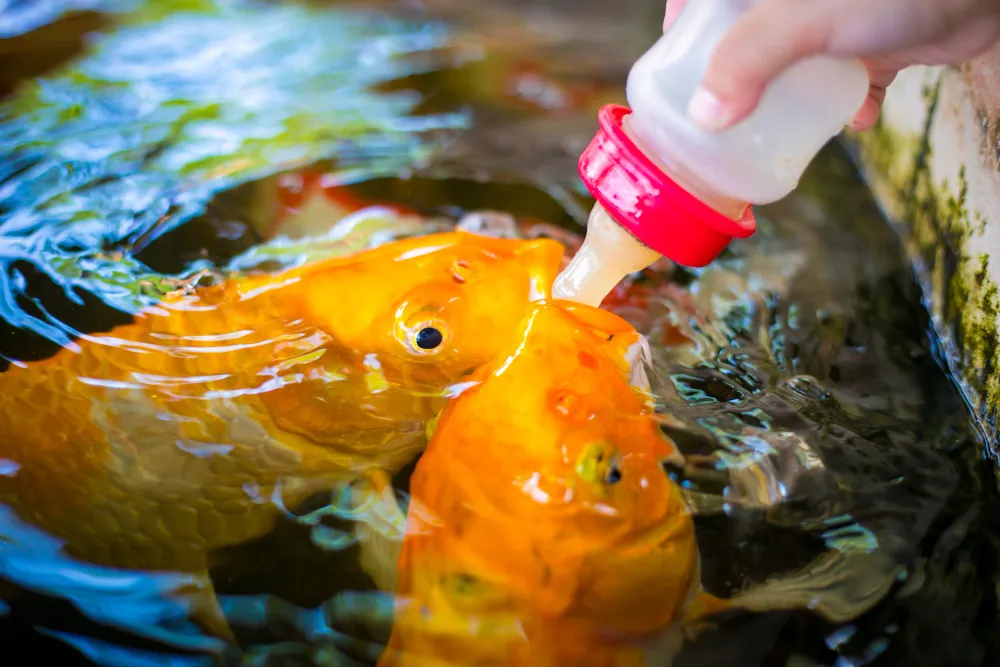
Koi Fish Nutrition: A Comprehensive Guide to Keeping Your Koi Healthy and Happy
Introduction koi fish nutrition
koi fish nutrition, Koi fish are more than just beautiful additions to your pond; they’re living jewels that deserve the best care. Proper nutrition is the cornerstone of a koi fish’s health, longevity, and stunning appearance. But what exactly does a well-balanced koi diet look like? Let’s dive into the details.
Understanding Koi Fish Diet koi fish nutrition
Koi are omnivores, meaning they eat both plant and animal matter. In the wild, their diet consists of algae, insects, and small aquatic creatures. However, captive koi rely entirely on their caretakers to meet their nutritional needs. Balancing this diet is crucial for their health and vibrant colors.
Essential Nutrients for Koi Fish
Proteins and Their Importance
Proteins are the building blocks of growth and repair. Young koi, in particular, require high-protein diets to support rapid growth, while adult koi need it for tissue maintenance.
Carbohydrates as an Energy Source
Carbohydrates provide energy for daily activities. While they are essential, too much can lead to fat buildup, so balance is key.
Fats for Growth and Reproduction
Fats are a source of long-term energy and are vital for reproductive health. Look for foods with healthy fat content to ensure your koi are thriving.
Vitamins and Minerals for Immune Health
Vitamins like A, C, and D, along with essential minerals, bolster the immune system and improve overall health.
Types of Koi Fish Food
Commercial Koi Pellets
Commercial pellets are the easiest and most common food option. They come in various sizes and formulations tailored to koi at different life stages.
Homemade Koi Fish Food
Making your own koi food allows you to control the ingredients and cater to specific needs, such as boosting color or aiding digestion.
Treats and Supplementary Foods
Koi love treats like earthworms, shrimp, and even some fruits and vegetables. However, treats should be occasional to avoid unbalancing their diet.
Seasonal Feeding Habits
Feeding During Spring and Summer
Warm weather boosts koi metabolism. During these months, provide a high-protein diet to support their increased activity.
Adjusting Diets in Autumn
As temperatures drop, switch to low-protein, wheat germ-based food to prepare koi for winter.
Winter Feeding Tips
In colder months, koi enter a state of semi-hibernation and eat less. Feed sparingly and only if water temperatures are above 10°C.
Feeding Techniques and Best Practices
- Feed small portions your koi can finish in 5 minutes.
- Offer food 2-4 times a day during warm months.
- Avoid overfeeding, which can lead to poor water quality and obesity.
Understanding Water Quality and Its Impact on Nutrition
Water quality directly affects koi digestion and nutrient absorption. Maintain a clean pond and monitor temperature, as cold water slows metabolism.
Common Koi Feeding Mistakes
- Overfeeding can lead to obesity and polluted water.
- Feeding unsuitable food, like bread or processed snacks, can harm koi health.
Koi Nutrition for Specific Goals
Enhancing Color Vibrancy
Foods rich in carotenoids, like spirulina, can bring out koi’s reds and oranges.
Promoting Growth
High-protein diets are essential for young koi to reach their full potential.
Supporting Breeding
Include vitamin-rich food to improve fertility and support healthy offspring.
Identifying Signs of Malnutrition
Watch for dull colors, lethargy, and reduced appetite. These may indicate nutritional deficiencies.
Supplements for Koi Fish
Supplements like probiotics and vitamins can boost health, especially during stress or illness.
DIY Koi Food Recipes
Creating homemade food is easy. Combine ingredients like fish meal, wheat germ, and vegetables, and freeze into bite-sized portions.
Tips for Choosing the Right Koi Food
- Read labels to understand nutritional content.
- Choose food based on the age, size, and activity level of your koi.
Conclusion koi fish nutrition
A well-fed koi is a happy koi. By understanding their nutritional needs, you can ensure your koi are healthy, vibrant, and a joy to watch. Whether you choose commercial pellets or get creative with DIY recipes, balance is the key to a thriving pond.
FAQs koi fish nutrition
- What is the best food for koi fish growth?
High-protein foods like shrimp or specialized growth pellets are ideal for young koi. - Can koi fish eat fruits and vegetables?
Yes, koi enjoy treats like watermelon, peas, and lettuce. Just remember to chop them into bite-sized pieces. - How often should I feed my koi?
During warm months, feed 2-4 times daily. In colder weather, reduce feeding frequency. - Why is my koi fish refusing to eat?
Stress, illness, or unsuitable water conditions could be the cause. Check water quality and observe for other symptoms. - Is it okay to feed koi fish human food?
Stick to natural options like fruits and vegetables. Avoid processed or sugary foods.
You may also like
- https://giobelkoicenter.com/koi-variety-discovering-30-koi-fish-varieties/
- https://giobelkoicenter.com/9-koi-fish-feng-shui/
- https://giobelkoicenter.com/lucky-number-of-koi-fish-in-a-pond/
- https://giobelkoicenter.com/koi-competitions/
- https://giobelkoicenter.com/cultural-significance-of-koi-fish/
Table of Contents
Passionate about fish keeping since elementary school in the 1980s, Giovanni Carlo has dedicated countless hours to collecting and breeding a diverse array of ornamental freshwater fish. From vibrant guppies and majestic koi to striking bettas and classic goldfish, he continues to explore the fascinating world of aquatics, sharing knowledge and enthusiasm with fellow fish enthusiasts.
